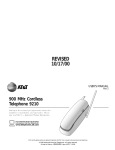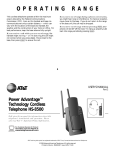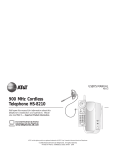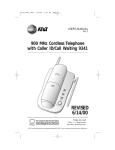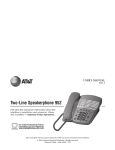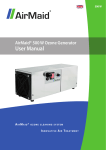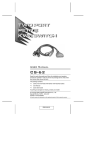Download AT&T 9320/8220 User's Manual
Transcript
OPERATING RANGE This cordless telephone operates within the maximum power allowed by the Federal Communications Commission (FCC). Even so, this handset and base can communicate over only a certain distance — which can vary with the locations of the base and handset, the weather, and the construction of your home or office. For best performance, keep the base antenna fully upright. If you move out of range during a phone conversation, you might hear noise or interference. To improve reception, move closer to the base. If you move out of range without pressing O, your phone will be left “off the hook.” To hang up properly, walk back into range, periodically pressing O. If you receive a call while you are out of range, the handset might not ring — or if it does ring, the call might not connect when you press P. Move closer to the base, then press P to answer the call. REVISED 5/17/01 USER’S MANUAL Part 2 900 MHz Cordless Telephone 9320/8220 Fold open this manual for information about this telephone’s installation and operation. Please also read Part 1 — Important Product Information. AT&T and the globe symbol are registered trademarks of AT&T Corp. licensed to Advanced American Telephones. © 2001 Advanced American Telephones. All rights reserved. Printed in China. Issue 1AT&T 05/01 INSTALLATION Before You Install 1 2 This phone requires a modular telephone jack and a standard electrical outlet (110v AC) not controlled by a wall switch. Choose a location for the base near an electrical outlet and a telephone jack. Install the handset battery. a) Remove battery compartment cover by pressing on the indentation and sliding downward. b) Plug battery pack connector into handset. Use only AT&T battery 3301 (SKU# 91076). c) Place battery pack and wires in compartment. d) Replace cover by sliding it up into place. Table/Desk Installation Standard electrical outlet 2 3 4 1 Connect the telephone line cord. Connect the power cord. Modular telephone jack Use only the power cord supplied with this product. If you need a replacement, call 1 800 222–3111. Charge the handset battery. Place the handset in the base. Charge the battery for at least 24 hours the first time. After the first charge, the battery is typically fully charged overnight. Check for dial tone. After the batteries are charged, pick up the handset and press P; you should hear a dial tone. 5 1 Set the dial mode. If you have touch tone service, the phone is ready to use as soon as the batteries are charged. If you have dial pulse (rotary) service, you’ll need to change the dial mode. When the phone is off, press G, *, #, M to set the dial mode to dial pulse. To return to touch tone dialing, press G, *, *, M. INSTALLATION Wall Installation 1 2 Connect the telephone line cord. Connect the power cord. Use only the power cord supplied with this product. If you need a replacement, call 1 800 222–3111. Standard electrical outlet Mounting studs Modular telephone jack 3 4 Mount the base on the wall. Align holes on base with mounting studs on wall jack. Pull base down on mounting studs until it locks into place. Follow Steps 3–5 in “Table/Desk Installation.” 2 INSTALLATION Belt Clip Installation Attach the belt clip to the cordless handset (optional). To attach To remove BATTERIES Charging the Handset Battery Pack Replacing the Handset Battery Pack This battery should remain charged up to six days with the ringer turned on and up to 12 days with the ringer off. A fully charged battery provides an average talk time of about six hours. 1 2 3 The battery pack needs charging when: • A new battery is installed in the handset. • The phone beeps twice when you press P. • The phone light flashes slowly. 4 5 Place the handset in the base so the CHARGING light turns on. The battery pack is typically fully charged in eight hours. You can keep the battery fully charged by returning the handset to the base after each use. If you repeatedly get a low battery indicator, even after eight hours of charging, the battery should be replaced. Use only AT&T battery 3301 (SKU# 91076). CAUTION: Charge the battery provided with or identified for use with this product only in accordance with the instructions and limitations specified in the User’s Manual, Part 1. 3 Remove the battery compartment cover on the handset by pressing on the indentation and sliding the cover downward. Lift out the old battery pack and disconnect. Plug battery pack connector into handset. Place the battery pack and wires in the compartment. Replace the cover by sliding it up into place. The new battery pack must be charged before using the phone. Place the handset in the base and allow it to charge for at least 24 hours the first charge. The telephone might operate before that, but for best performance, let the battery pack charge fully. TELEPHONE OPERATION Answer a Call Lift handset from base — OR — Press any key. Headset Jack You can use this telephone hands-free when you install a 2.5 mm headset, included or purchased separately. Plug the headset into the jack under the small rubber flap. Do not force the connection, but make sure the plug fits securely. Make a Call Press and wait for light to go on steadily. End a Call Flash/Call Waiting Place handset in base — OR — Press O. Access special telephone company subscriber services. Exit programming without saving. Cancel a page. Redial Press P, then press to call the last number dialed (up to 16 digits). Temporary Tone Dialing Press to change from dial pulse to touch tone dialing during a call. This is useful if you have dial pulse (rotary) service and need to send touch tone signals for access to telephone banking or long-distance services. 1 Dial the number. 2 Press *. Buttons pressed after this send touch tone signals. 3 After you hang up, the phone automatically returns to dial pulse (rotary) service. Change Channel Press to switch to a clearer channel. Handset Ringer Style/ Battery Save Select from four different handset ringer styles, or turn the ringer off and extend battery life. 1 Make sure the handset is off. 2 Press G, #. 3 Press 1, 2, 3 or 4 to select your ringer style (you will hear a sample), or press 5 to turn the ringer off. 4 Press M. When the ringer is off, select a ringer style to turn it on again. Handset Volume Adjust volume of what you hear through the handset. 4 TELEPHONE OPERATION Indicates handset is charging in base Page/Handset Locator Indicates handset is in use Press once to page the handset for up to one minute — OR — Press twice to cancel. 5 TELEPHONE MEMORY This cordless phone can store 10 telephone numbers, each up to 16 digits long. You can dial numbers stored in memory just by pressing P, M and a number button. Store Memory Numbers 1 Make sure the handset is off. 2 Press G. The phone light blinks. 3 Press the number button (0–9) where you want to store the telephone number. 4 Dial the telephone number (up to 16 digits) — OR — Press to store the last number dialed. 5 Press M. Store a Pause in a Memory Number Press to store a two-second pause in the dialing sequence. Each press adds another two-second pause and counts as one digit. Change/Replace a Stored Memory Number Store a new number in its place. Directory Label Use the included self-adhesive directory label to keep a record of the numbers (or names) stored in memory. It’s best to write on the label before applying it to the phone. Dial Memory Numbers 1 Press P. 2 Press and release M, then press the number button (0–9) where the memory number is stored. 6 IN C ASE OF DIFFICULTY If you have difficulty operating this phone, try the suggestions below. For Customer Service, visit our website at www.telephones.att.com or call 1 800 222–3111. Please retain your receipt as your proof of purchase. If you hear noise or interference when using the phone: • • • If the phone doesn’t work at all, check these items first: • • • • • • • Make sure the AC adapter is plugged into an outlet not controlled by a wall switch. Make sure the telephone line cord is plugged firmly into the base unit and the modular jack. Make sure the base antenna is fully upright. If the handset does not beep when you press P, the battery might need charging. Make sure the battery pack is installed correctly. If you have dial pulse (rotary) service on your phone line, make sure the dial mode is set to dial pulse (see INSTALLATION). • • If you hear other calls while using your phone: • • If the above suggestions don’t solve the problem, try re-initializing the handset and base: 1 2 3 4 5 6 Disconnect the power to the base. Remove the handset battery pack. Wait a few minutes. Connect the power to the base. Insert the handset battery pack. Put the handset in the base to re-initialize. • • You were probably almost out of range. Move closer to the base before changing channels. Before placing another call, set the handset in the base for at least 15 seconds. If you are unable to operate special telephone services or other equipment requiring touch tone signals: If you have dial pulse (rotary) service, follow the directions under “Temporary Tone Dialing” in the TELEPHONE OPERATION section of this manual. You might be out of range. Move closer to the base and try again. If moving closer to the base doesn’t help, try following the directions above for re-initializing the handset and base. The handset battery charge may have become low. Try charging the handset battery. If the phone does not ring when you receive a call: • • • • • Press C to change to another channel. Disconnect the base from the modular jack and plug in a corded telephone. If you still hear other calls, the problem is probably in your wiring or local service. Call your local telephone service company. If you lose a call after changing channels: If you hear a two-beep signal when you try to use the handset: • Make sure the base antenna is fully upright. You may be out of range. Move closer to the base. Press and release C to change to another of the 30 channels available. If noise is exceptionally loud, move closer to the base before changing channels. Household appliances plugged into the same circuit as the base can sometimes cause interference. Try moving the appliance or the base to another outlet. The layout of your home or office might be limiting the operating range. Try moving the base to another location, preferably on an upper floor. If the buttons don’t work, try placing the handset in the base for at least 15 seconds. Make sure the handset ringer is on. Make sure the telephone line cord is connected firmly to the base and the telephone jack. Make sure the AC adapter is plugged firmly into an outlet not controlled by a wall switch. You might be too far from the base; move closer. You might have too many extension phones on your telephone line to allow all of them to ring. Try unplugging some of them. 7








